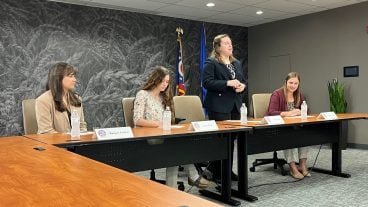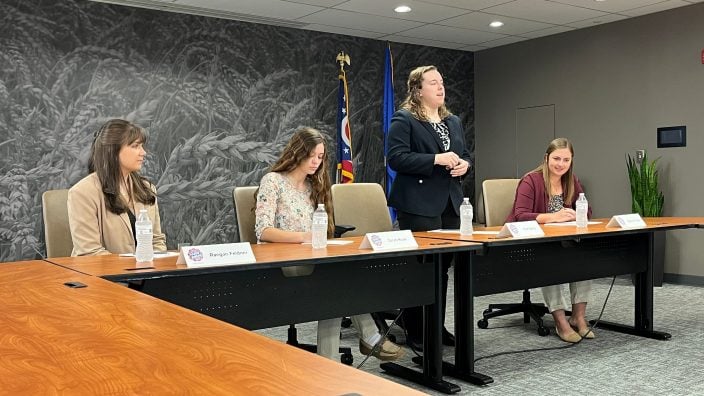Applications for Ohio Farm Bureau Health Plans now available
Members have three ways to apply: contacting a certified agent, calling 833-468-4280 or visiting ohiofarmbureauhealthplans.org.
Read MoreSome aspects of the new two-year state budget will better protect farmers from nuisance lawsuits. Ohio Farm Bureau Policy Counsel Leah Curtis visits with Ohio Farm Bureau Director of Media Relations Ty Higgins about the language included in the budget and its importance to agriculture.
Listen to Legal with Leah, a podcast featuring Ohio Farm Bureau’s Policy Counsel Leah Curtis discussing topics impacting farmers and landowners.
Ty Higgins: In mid-July, Ohio legislators passed a new two-year, $69 billion state budget. It was signed by Governor DeWine shortly thereafter. The budget, as you might expect, mostly consists of a lot of numbers, adding some funds to programs, taking away funds from others. There’s also some language in the new budget that will be better protecting farmers from nuisance lawsuits. That’s our topic for this week’s Legal with Leah. Along with Ohio Farm Bureau Policy Counsel Leah Curtis, I’m Ty Higgins and Leah, you and I visited about there being an affirmative defense for farms enrolled in an ag district with some caveats. That came up not long after Toledo voters passed the Lake Erie Bill of Rights back in February. How does this budget address issues like LEBOR?
Leah Curtis: So what the budget did was it changed the nuisance protection just slightly so it does still apply to those who are enrolled in an ag district but also now would apply to those who are qualified and enrolled in the Current Ag Use Valuation program which a lot of people are going to do because it does make their taxes a little better. And so it just expands it a little bit and reduces a little bit of that paperwork burden. If you’re already enrolling in CAUV, you don’t have to also necessarily enroll for the affirmative defense in the ag district. It removed a couple of the requirements as well, so it should be a little bit easier to take advantage of and that way farmers will be able to use the defense when a nuisance lawsuit comes around. Now again as we’ve always said with the LEBOR situation, we don’t know for sure that those lawsuits would be considered nuisance and whether this defense would be the slam dunk. But as I always say as lawyer, I want every farmer to have every tool in the toolbox that they can and so if there’s any chance it would work, we want farmers to be able to use this and have this at their disposal as needed.
Ty Higgins: And there are other tools. What are other affirmative defense examples that can apply for farmers?
Leah Curtis: So there’s a few. If you have a concentrated animal feeding operation permit through the large livestock program at ODA and you are acting in accordance with that and the best management practices in that permit, there is an affirmative defense under that. There’s also one for any claims that are related to the spreading of fertilizer, so long as you have an approved NMP (nutrient management plan) and you’re acting in accordance with your plan. That happened in compliance with the fertilizer certification program. And then lastly if you are sued for a nuisance claim related to manure, and again you have an approved NMP and you’re acting in accordance with it, then there also may be an affirmative defense available for you in that case.
Ty Higgins: The one thing we really want to stress here to our members is that affirmative defense in all of its forms doesn’t prevent someone from suing you.
Leah Curtis: Yes. So a lot of people will say this is a complete defense. I don’t like the word complete because the fact is that a defense…you can use it once somebody sues you but you can’t stop somebody from filing a lawsuit. That would violate their constitutional rights to access the courts. So it is there, once the lawsuit is filed, to help get that lawsuit taken care of in a more quick manner, hopefully reduce the need for lots of attorneys fees and get you out of the courthouse as quickly as possible.
Ty Higgins: Leah Curtis is policy counsel with Ohio Farm Bureau. This has been Legal with Leah. Thanks for listening. I’m Ty Higgins. We’ll see you down the road.


Members have three ways to apply: contacting a certified agent, calling 833-468-4280 or visiting ohiofarmbureauhealthplans.org.
Read More

Collegiate Farm Bureau serves as a connection to current industry professionals and equips the next generation with the essential tools and resources needed to excel in their careers.
Read More

Ohio Farm Bureau members met one-on-one with state legislators and staff to discuss policy priorities impacting Ohio’s farms and rural communities.
Read More

Legacy nutrient deductions enable new farmland owners to claim deductions on the nutrients within the soil on which healthy crops depend.
Read More

Farmers, agribusinesses and community members are encouraged to nominate their local fire departments for Nationwide’s Nominate Your Fire Department Contest through April 30.
Read More

Introduced by Sen. Paula Hicks-Hudson, SB 120 would establish the Urban Farmer Youth Initiative Pilot Program.
Read More

Gases, vapors, and fumes can all create risk. How can we measure and protect ourselves from them?
Read More

The Ohio Farm Bureau’s Young Agricultural Professionals State Committee has named its 2026 leadership and the individuals who will be serving on the state committee for 2026-2028.
Read More

The Ohio Farm Bureau Foundation has multiple scholarships available to Ohio students from rural, suburban and urban communities who are pursuing degrees with a connection to the agricultural industry.
Read More

With 100% bonus depreciation now permanent, farmers can deduct the full cost of a new agricultural building in the year it’s placed in service.
Read More